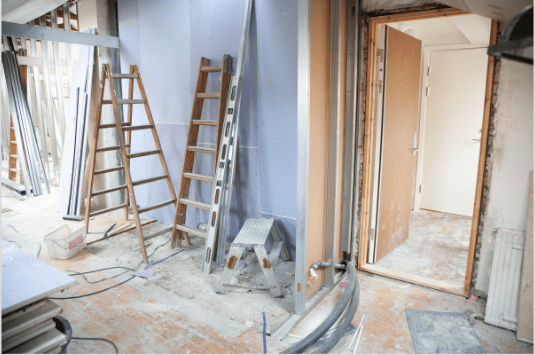When renovating a house for the purpose of flipping it, the flipper can be tempted to forgo permits for building, electrical, and plumbing. The flipper is likely concerned about the cost of the permits in addition to the potential delay in receiving them. What happens if the flipper decides not to obtain the required permits? The consequences can be many and can be severe. For example:
- The home’s appraisal could be negatively impacted by work occurring without a permit. An appraiser may assign a lower value if she determines that work was performed in the absence of a permit. That can impact what a prospective buyer is willing to pay—or if a prospective buyer is willing to purchase at all.
- If the work is performed without a permit, the likelihood of faulty work increases. And that can mean potential damage or catastrophe.
- An inspector can drive by, notice work being performed, and check whether that work has been permitted. If it has not, the homeowner will incur fines. Similarly, neighbors can alert the permit office of work being performed without a permit. A homeowner can end up paying more in fines than she would have paid for the permits in the first place.
- If work was done without a permit and the house is damaged as a result, there may be issues with insurance coverage, which could range from limitation on what the insurance company will cover (the homeowner may need to cover the cost of bringing the work up to code) to being dropped by the carrier after the claim is settled.
Think that just will not happen? You should know that in the summer of 2018, the District of Columbia launched an “Illegal Construction Blitz” which resulted in the issuance of many stop work orders (SWOs). The District of Columbia encouraged illegal construction activity to be reported in its press release about the “blitz.” Ultimately, more than $271,000 in potential fines for illegal construction were issued during the blitz.
Best Permitting Practices:
- Make sure you are knowledgeable about local permitting requirements.
- Make sure your contractor provides you with copies of all permits.
- Post your permits in a location visible to neighbors so that they can be assured that the work is legal.
- Do not hire any unlicensed contractors.
- If you are doing the project yourself, make sure you pull your own permits or hire someone to pull them for you.
Below we provide some county-specific information that may be of assistance.
Baltimore County
In Baltimore County, permit applications must be completed in person. Instructions for how to apply for a building permit can be found here. Need the building code for Baltimore County (effective July 1, 2015)? It can be found here.
In terms of fees, Baltimore County’s permit fee schedule is available here.
What requires building permits in Baltimore County? You might be surprised to learn that above ground swimming pools over 250 square feet with water depth of 24 inches or more require a building permit, or that sheds over 120 square feet do. Baltimore County provides a full list of what requires a building permit here.
Baltimore City
Baltimore City provides the following information on its website:
A permit is required to:
- Construct, enlarge, alter, repair, rehabilitate, demolish (interior or exterior) or move any structure
- Erect, install, enlarge, alter, repair, remove, convert, or replace any electrical, gas, mechanical or plumbing system
- Change the use of any structure or land
- Perform any grading or excavating
As a general rule of thumb, minor repairs do not usually require permits, unless the item is being replaced altogether or significantly altered. Renovations, modifications, and reconstructions always require a permit.
Baltimore City allows for permit applications to be submitted online. This includes permits for the following:
- Construction/Alterations (1 & 2 family dwellings)
- HVAC & R
- Plumbing
- Gas
- Amendments (to add or change contractors)
- Underpinning
- Permit Extension
- Use and Occupancy
- Demolition
For those applying for Baltimore City permits, the good news is that the turn-around time is short. In fact, “[a]pplications submitted for electrical, plumbing, HVAC&R, gas, extensions, and amendments to change or add contractors that do not require agency review will be ready for payment within one hour of submission, 24 hours a day, 7 days a week. For all other permit types, applications submitted by 9:00 AM will receive an approval or response by 2:00 PM the same business day. Those submitted after 9:00 AM will receive an approval or response by 2:00 PM the following business day.”
Baltimore City provides a very handy Permit Handbook on its website.


